formerly eScholarship Editions


|
|
|
|
Your search for
'Law' in subject
found 64 book(s). | Modify Search | Displaying 1 - 20 of 64 book(s) | |
| 1. | 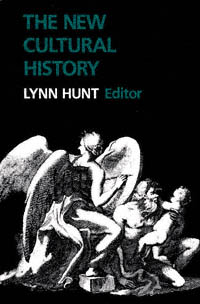 | Title: The New cultural history: essays by Aletta Biersack ... [et al.] Author: Biersack, Aletta Published: University of California Press, 1989 Subjects: Law Publisher's Description: Across the humanities and the social sciences, disciplinary boundaries have come into question as scholars have acknowledged their common preoccupations with cultural phenomena ranging from rituals and ceremonies to texts and discourse. Literary critics, for example, have turned to history for a deepening of their notion of cultural products; some of them now read historical documents in the same way that they previously read "great" texts. Anthropologists have turned to the history of their own discipline in order to better understand the ways in which disciplinary authority was constructed. As historians have begun to participate in this ferment, they have moved away from their earlier focus on social theoretical models of historical development toward concepts taken from cultural anthropology and literary criticism.Much of the most exciting work in history recently has been affiliated with this wide-ranging effort to write history that is essentially a history of culture. The essays presented here provide an introduction to this movement within the discipline of history. The essays in Part One trace the influence of important models for the new cultural history, models ranging from the pathbreaking work of the French cultural critic Michel Foucault and the American anthropologist Clifford Geertz to the imaginative efforts of such contemporary historians as Natalie Davis and E. P. Thompson, as well as the more controversial theories of Hayden White and Dominick LaCapra. The essays in Part Two are exemplary of the most challenging and fruitful new work of historians in this genre, with topics as diverse as parades in 19th-century America, 16th-century Spanish texts, English medical writing, and the visual practices implied in Italian Renaissance frescoes. Beneath this diversity, however, it is possible to see the commonalities of the new cultural history as it takes shape. Students, teachers, and general readers interested in the future of history will find these essays stimulating and provocative. [brief] Similar Items |
| 2. | 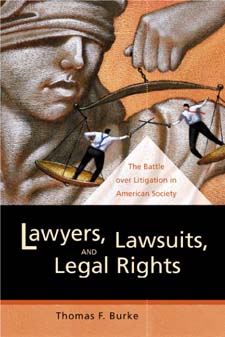 | Title: Lawyers, lawsuits, and legal rights: the battle over litigation in American society Author: Burke, Thomas Frederick Published: University of California Press, 2002 Subjects: Politics | Law Publisher's Description: Lawsuits over coffee burns, playground injuries, even bad teaching: litigation "horror stories" create the impression that Americans are greedy, quarrelsome, and sue-happy. The truth, as this book makes clear, is quite different. What Thomas Burke describes in Lawyers, Lawsuits, and Legal Rights is a nation not of litigious citizens, but of litigious policies - laws that promote the use of litigation in resolving disputes and implementing public policies. This book is a cogent account of how such policies have come to shape public life and everyday practices in the United States. As litigious policies have proliferated, so have struggles to limit litigation - and these struggles offer insight into the nation's court-centered public policy style. Burke focuses on three cases: the effort to block the Americans with Disabilities Act; an attempt to reduce accident litigation by creating a no-fault auto insurance system in California; and the enactment of the Vaccine Injury Compensation Act. These cases suggest that litigious policies are deeply rooted in the American constitutional tradition. Burke shows how the diffuse, divided structure of American government, together with the anti-statist ethos of American political culture, creates incentives for political actors to use the courts to address their concerns. The first clear and comprehensive account of the national politics of litigation, his work provides a new way to understand and address the "litigiousness" of American society. [brief] Similar Items |
| 3. | 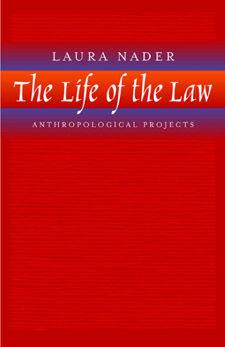 | Title: The life of the law: anthropological projects Author: Nader, Laura Published: University of California Press, 2002 Subjects: Anthropology | Law Publisher's Description: Laura Nader, an instrumental figure in the development of the field of legal anthropology, investigates an issue of vital importance for our time: the role of the law in the struggle for social and economic justice. In this book she gives an overview of the history of legal anthropology and at the same time urges anthropologists, lawyers, and activists to recognize the centrality of law in social change. Nader traces the evolution of the plaintiff's role in the United States in the second half of the twentieth century and passionately argues that the atrophy of the plaintiff's power during this period represents a profound challenge to justice and democracy. Taking into account the vast changes wrought in both anthropology and the law by globalization, Nader speaks to the increasing dominance of large business corporations and the prominence of neoliberal ideology and practice today. In her discussion of these trends, she considers the rise of the alternative dispute resolution movement, which since the 1960s has been part of a major overhaul of the U.S. judicial system. Nader links the increasing popularity of this movement with the erosion of the plaintiff's power and suggests that mediation as an approach to conflict resolution is structured to favor powerful--often corporate--interests. [brief] Similar Items |
| 4. | 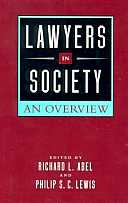 | Title: Lawyers in society [computer file]: an overview Author: Abel, Richard L Published: University of California Press, 1996 Subjects: Law | Sociology | Politics Publisher's Description: Among all those who encounter the law in the conduct of their lives or who consider it as a career, few have a solid understanding of the legal profession in America, and fewer still know anything about systems in other parts of the world. Lawyers in Society offers a concise comparative introduction to the practice of law in a number of countries: England, Germany, Japan, Venezuela, and Belgium.Extracted from the editors' three highly successful volumes Lawyers in Society , these essays guide readers through the differing worlds of civil and common law, law in Europe and Asia, and first and third world legal systems. One contribution addresses the changing role of women in the profession - women comprise half of all new lawyers in most countries - and the changes they are bringing. A new introduction and concluding essay reflect on the place of this volume in current and future research. [brief] Similar Items |
| 5. |  | Title: Insight and solidarity: a study in the discourse ethics of Jürgen Habermas Author: Rehg, William Published: University of California Press, 1997 Subjects: Philosophy | Law | Politics Publisher's Description: Discourse ethics represents an exciting new development in neo-Kantian moral theory. William Rehg offers an insightful introduction to its complex theorization by its major proponent, Jürgen Habermas, and demonstrates how discourse ethics allows one to overcome the principal criticisms that have been leveled against neo-Kantianism.Addressing both "commun-itarian" critics who argue that universalist conceptions of justice sever moral deliberation from community traditions, and feminist advocates of the "ethics of care" who stress the moral significance of caring for other individuals, Rehg shows that discourse ethics combines impartiality with solidarity. He provides the first systematic reconstruction of Habermas's theory and explores its relationship to the work of such contemporary philosophers as Charles Taylor. His book articulates a bold alternative to the split between the "right" and the "good" in moral theory and will greatly interest philosophers, social and legal scholars, and political theorists. [brief] Similar Items |
| 6. | 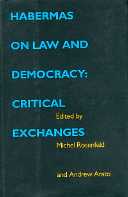 | Title: Habermas on law and democracy: critical exchanges Author: Rosenfeld, Michel 1948- Published: University of California Press, 1998 Subjects: Philosophy | Law | Politics Publisher's Description: In the first essay, Habermas himself succinctly presents the centerpiece of his theory: his proceduralist paradigm of law. The following essays comprise elaborations, criticisms, and further explorations by others of the most salient issues addressed in his theory. The distinguished group of contributors - internationally prominent scholars in the fields of law, philosophy, and social theory - includes many who have been closely identified with Habermas as well as some of his best-known critics. The final essay is a thorough and lengthy reply by Habermas, which not only engages the most important arguments raised in the preceding essays but also further elaborates and refines some of his own key contributions in Between Facts and Norms . This volume will be essential reading for philosophers, legal scholars, and political and social theorists concerned with understanding the work of one of the leading philosophers of our age.These provocative, in-depth debates between Jürgen Habermas and a wide range of his critics relate to the philosopher's contribution to legal and democratic theory in his recently published Between Facts and Norms . Drawing upon his discourse theory, Habermas has elaborated a novel and powerful account of law that purports to bridge the gap between democracy and rights, by conceiving law to be at once self-imposed and binding. [brief] Similar Items |
| 7. |  | Title: Tokugawa village practice: class, status, power, law Author: Ooms, Herman Published: University of California Press, 1996 Subjects: History | Asian History | Japan | Law Publisher's Description: In contrast to modern Japanese citizens, during the Tokugawa period (1600-1868) villagers frequently resorted to lawsuits to settle conflicts. Herman Ooms uses colorful, skillfully analyzed case studies to trace the evolution of class and status conflicts through lawsuits and petitions in villages. Inspired by the work of Max Weber and Pierre Bourdieu, this exploration of social and legal history illuminates the texture and detail of village life, focusing on relations to authority.Opening with a story of an angry peasant woman's lifelong struggle against village authority (a story involving murder and revenge), Ooms highlights the role played by obscure historical actors including local elites, commoners, women, and outcastes. He also discusses the important role lineages played in village politics and examines the origins of discrimination against Japan's burakumin , or outcastes. [brief] Similar Items |
| 8. | 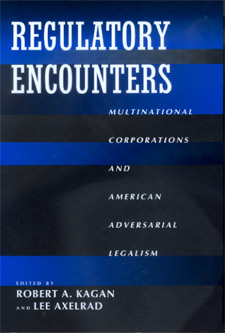 | Title: Regulatory encounters: multinational corporations and American adversarial legalism Author: Axelrad, Lee 1963- Published: University of California Press, 2000 Subjects: Politics | Public Policy | Law Publisher's Description: Regulatory Encounters reports on a path-breaking study of how government regulation of business in the United States differs in practice from regulation in other economically advanced democracies. In each of ten in-depth case studies, the contributors to this volume compare a particular multinational corporation's experience with parallel regulatory regimes in the United States and in Japan, Canada, Great Britain, Germany, The Netherlands, and the European Union, noting precisely which regulatory precautions were actually implemented in each country. The regulatory systems analyzed include aspects of environmental protection, product safety, debt collection, employees' rights, and patent protection. The studies in Regulatory Encounters indicate that the adversarial and legalistic character of American regulation imposes higher costs and delays on economic activity than comparable regulatory regimes in other economically advanced democracies, and often does not generate higher levels of protection for the public. [brief] Similar Items |
| 9. | 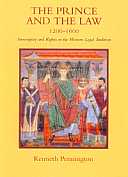 | Title: The prince and the law, 1200-1600: sovereignty and rights in the western legal tradition Author: Pennington, Kenneth Published: University of California Press, 1993 Subjects: History | Medieval History | Law Publisher's Description: The power of the prince versus the rights of his subjects is one of the basic struggles in the history of law and government. In this masterful history of monarchy, conceptions of law, and due process, Kenneth Pennington addresses that struggle and opens an entirely new vista in the study of Western legal tradition.Pennington investigates legal interpretations of the monarch's power from the twelfth to the seventeenth century. Then, tracing the evolution of defendants' rights, he demonstrates that the origins of due process are not rooted in English common law as is generally assumed. It was not a sturdy Anglo-Saxon, but, most probably, a French jurist of the late thirteenth century who wrote, "A man is innocent until proven guilty."This is the first book to examine in detail the origins of our concept of due process. It also reveals a fascinating paradox: while a theory of individual rights was evolving, so, too, was the concept of the prince's "absolute power." Pennington illuminates this paradox with a clarity that will greatly interest students of political theory as well as legal historians. [brief] Similar Items |
| 10. |  | Title: Random violence: how we talk about new crimes and new victims Author: Best, Joel Published: University of California Press, 1999 Subjects: Sociology | Social Problems | Law | Criminology Publisher's Description: Random Violence is a deft and thought-provoking exploration of the ways we talk about - and why we worry about - new crimes and new forms of victimization. Focusing on so-called random crimes such as freeway shootings, gang violence, hate crimes, stalking, and wilding, Joel Best shows how new crime problems emerge and how some quickly fade from public attention while others spread and become enduring subjects of concern. Best's original and incisive argument illuminates the fact that while these crimes are in actuality neither new, nor epidemic, nor random, the language used to describe them nonetheless shapes both private fears and public policies.Best scrutinizes the melodramatic quality of the American public's attitudes toward crime, exposing the cultural context for the popularity of "random violence" as a catch-all phrase to describe contemporary crime, and the fallacious belief that violence is steadily rising. He points out that the age, race, and sex of homicide victims reveal that violence is highly patterned.Best also details the contemporary ideology of victimization, as well as the social arrangements that create and support a victim industry that can label large numbers of victims. He demonstrates why it has become commonplace to "declare war" on social problems, including drugs, crime, poverty, and cancer, and outlines the complementary influence of media, activists, officials, and experts in institutionalizing crime problems. Intrinsic to all these concerns is the way in which policy choices and outcomes are affected by the language used to describe social problems. [brief] Similar Items |
| 11. | 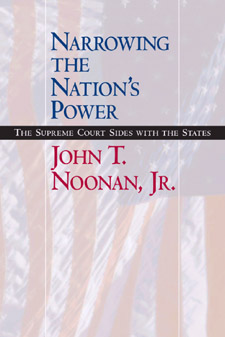 | Title: Narrowing the nation's power: the Supreme Court sides with the states Author: Noonan, John Thomas 1926- Published: University of California Press, 2002 Subjects: Law | American Studies | Political Theory Publisher's Description: Narrowing the Nation's Power is the tale of how a cohesive majority of the Supreme Court has, in the last six years, cut back the power of Congress and enhanced the autonomy of the fifty states. The immunity from suit of the sovereign, Blackstone taught, is necessary to preserve the people's idea that the sovereign is "a superior being." Promoting the common law doctrine of sovereign immunity to constitutional status, the current Supreme Court has used it to shield the states from damages for age discrimination, disability discrimination, and the violation of patents, trademarks, copyrights, and fair labor standards. Not just the states themselves, but every state-sponsored entity--a state insurance scheme, a state university's research lab, the Idaho Potato Commission - has been insulated from paying damages in tort or contract. Sovereign immunity, as Noonan puts it, has metastasized. "It only hurts when you think about it," Noonan's Yalewoman remarks. Crippled by the states' immunity, Congress has been further brought to heel by the Supreme Court's recent invention of two rules. The first rule: Congress must establish a documentary record that a national evil exists before Congress can legislate to protect life, liberty, or property under the Fourteenth Amendment. The second rule: The response of Congress to the evil must then be both "congruent" and "proportionate." The Supreme Court determines whether these standards are met, thereby making itself the master monitor of national legislation. Even legislation under the Commerce Clause has been found wanting, illustrated here by the story of Christy Brzonkala's attempt to redress multiple rapes at a state university by invoking the Violence Against Women Act. The nation's power has been remarkably narrowed. Noonan is a passionate believer in the place of persons in the law. Rules, he claims, are a necessary framework, but they must not obscure law's task of giving justice to persons. His critique of Supreme Court doctrine is driven by this conviction. [brief] Similar Items |
| 12. | 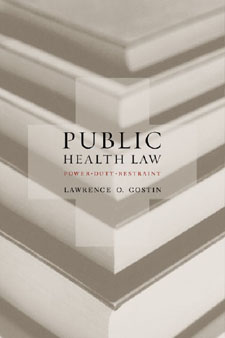 | Title: Public health law: power, duty, restraint Author: Gostin, Larry O. (Larry Ogalthorpe) Published: University of California Press, 2001 Subjects: Law | Medicine | Public Policy Publisher's Description: Gostin's timely book offers the first systematic definition and theory of public health law. Basing his definition on a broad notion of the government's inherent responsibility to advance the population's health and well-being, he develops a rich understanding of the government's fundamental powers and duties. By analyzing constitutional powers and limits, as well as statutory, administrative, and tort law, Public Health Law vividly shows how law can become a potent tool for the realization of a healthier and safer population. [brief] Similar Items |
| 13. |  | Title: Judgement in Jerusalem: Chief Justice Simon Agranat and the Zionist century Author: Lahav, Pnina 1945- Published: University of California Press, 1997 Subjects: Jewish Studies | Law | History Publisher's Description: Simon Agranat (1906-1992) was the third chief justice of the Israeli Supreme Court and a founding father of Israeli law. Born in Louisville, Kentucky, and educated at the University of Chicago, Agranat brought U.S. progressivism and constitutionalism to Israeli legal soil. Agranat laid the foundation for Israel's bill of rights and took part in nearly every important Israeli legal and political issue of this century. Pnina Lahav's rewarding study of Simon Agranat portrays Israeli history through the lens of judicial opinions. It is based on her extensive interviews with the justice before his death and a close examination of his papers. A major theme in her book is the relationship between Agranat's world view and landmark Israeli Supreme Court opinions, and she tells the compelling story of a visionary jurist and an American pursuing his Zionist dream in Palestine. Here, too, is an illuminating view of Israeli history and legal culture that includes the Arab-Israeli conflict, the Holocaust, the symbiosis between religion and the Jewish state, and the tensions within Zionism itself. Lahav also details the thinking behind Agranat's 1962 decision to convict Adolph Eichmann and the justice's dissent in the "Who Is a Jew?" case in 1970.This is the first biography of the man who made both a geographical and a psychological journey from the United States to Jerusalem. In demonstrating the influences of one culture on another, Judgment in Jerusalem provides important insights into Israeli law and politics and into the complex processes that form a national identity. [brief] Similar Items |
| 14. |  | Title: Justice in South Africa, Author: Sachs, Albie 1935- Published: University of California Press, 1973 Subjects: African Studies | Politics | Law Similar Items |
| 15. | 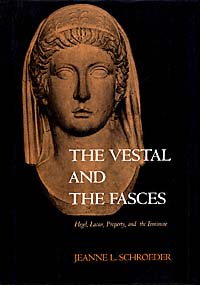 | Title: The vestal and the fasces: Hegel, Lacan, property, and the feminine Author: Schroeder, Jeanne Lorraine Published: University of California Press, 1998 Subjects: Law | Philosophy | Gender Studies Publisher's Description: In this feminist exploration of the erotics of the marketplace, Hegel's notion of property and Lacan's idea of the phallus serve parallel functions in creating the subjectivity necessary for self-actualization. Subjectivity requires intersubjective relationships mediated through a regime of possessing, enjoying, and exchanging an object of desire. For Hegel, this regime is property; for Lacan, it is sexuality, symbolized by the Phallus, which we conflate with the male organ and the female body. Property law, in Jeanne Schroeder's account, is implicitly figured by similar anatomical metaphors for that which men wish to possess and that which women try to be and enjoy. This is reflected in imagery taken from ancient Rome - the axe and bundle of sticks known as the Fasces, and the virgin priestess called the Vestal.Schroeder traces the persistence of phallic metaphors in modern jurisprudence. Rejecting the dominant schools of legal feminism, she reconceptualizes property - the legal relationship as well as its not necessarily material object - as a necessary moment in the human struggle for love and recognition. The Feminine, for Schroeder, is the radical negativity at the heart of both Lacan's split subject and Hegel's concept of freedom. Feminine emancipation and private property are, therefore, equally necessary conditions for the actualization of the free individual and the just society. Feminist scholars, social theorists, political scientists, philosophers, and lawyers will find in Schroeder's analysis scintillating new perspectives on property theory and the feminine within the market and the law. [brief] Similar Items |
| 16. | 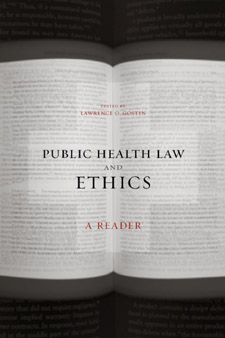 | Title: Public health law and ethics: a reader Author: Gostin, Larry O. (Larry Ogalthorpe) Published: University of California Press, 2002 Subjects: Law | Medicine | Health Care Publisher's Description: This incisive selection of government reports, scholarly articles, and court cases is designed to illuminate the ethical, legal, and political issues in the theory and practice of public health. A companion to the internationally acclaimed Public Health Law: Power, Duty, Restraint, this collection encourages debate and discourse about how courts, scholars, and policy makers respond to the salient legal and ethical dilemmas. The excerpts and commentaries in the reader analyze the legal and constitutional foundations of public health, juxtaposing them with the emerging importance of public health ethics and human rights. The book offers a systematic account of public health law, ethics, and human rights in promoting the common good. Gostin provides thoughtful commentary on the field of public health and carefully explains the meaning and importance of each selection. Scholars, legislators, and public health professionals, as well as faculty and students in schools of law, public health, medicine, nursing, government, and health administration, will benefit from the contemporary case studies covering a wide range of topics from bioterrorism to public health genetics. [brief] Similar Items |
| 17. | 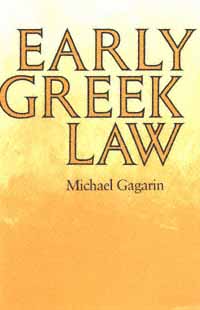 | Title: Early Greek law Author: Gagarin, Michael Published: University of California Press, 1989 Subjects: Classics | Classical Politics | Law Publisher's Description: Drawing on the evidence of anthropology as well as ancient literature and inscriptions, Gagarin examines the emergence of law in Greece from the 8th through the 6th centuries B.C., that is, from the oral culture of Homer and Hesiod to the written enactment of codes of law in most major cities. Similar Items |
| 18. | 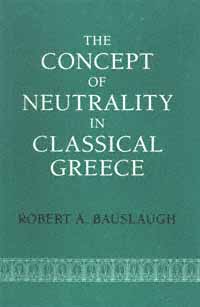 | Title: The concept of neutrality in classical Greece Author: Bauslaugh, Robert A Published: University of California Press, 1991 Subjects: Classics | Law | Classical History Publisher's Description: Looking at Classical warfare from the perspective of the non-belligerents, Robert A. Bauslaugh brings together the scattered evidence testifying to neutral behavior among the Greek city-states and their non-Greek neighbors. Were the Argives of 480/479 B.C. really "Medizers," as many have accused, or were they pursuing a justifiable policy of neutrality as they claimed? On what basis in international law or custom did the Corcyraeans claim non-alignment? Why were the leading belligerent states willing to accept the inclusion of a "neutrality clause" in the Common Peace of 371? These questions have not been asked by historians of international law, and the answers provide a far more complex and sophisticated picture of interstate relations than has so far been available.Despite the absence of exclusively diplomatic language, the concept of respect for neutrals appears early in Greek history and remains a nearly constant feature of Classical wars. The problems confronting uncommitted states, which have clear parallels in modern history, were balanced by widespread acceptance of the need for limitations on the chaos of warfare. [brief] Similar Items |
| 19. |  | Title: A democratic South Africa?: constitutional engineering in a divided society Author: Horowitz, Donald L Published: University of California Press, 1991 Subjects: Politics | African Studies | Sociology | Law Publisher's Description: Can a society as deeply divided as South Africa become democratic? In a most timely work, Donald L. Horowitz, author of the acclaimed Ethnic Groups in Conflict , points to the conditions that make democracy an improbable outcome in South Africa. At the same time, he identifies ways to overcome these obstacles, and he describes institutions that offer constitution makers the best chance for a democratic future.South Africa is generally considered an isolated case, a country unlike any other. Drawing on his extensive experience of racially and ethnically divided societies, however, Horowitz brings South Africa back into African and comparative politics. Experience gained in Nigeria, Botswana, Zimbabwe, and other divided societies around the world is relevant because, as South Africa leaves apartheid behind, it will still confront problems of pluralism: racial, ethnic, and ideological. Countries like South Africa, Horowitz argues, must develop institutions capable of coping with such divisions.Reviewing an array of constitutional proposals for South Africa - group rights, consociation, partition, binationalism, and an enhanced role for the judiciary - Horowitz shows that most are inappropriate for the country's problems, or else run afoul of some major ideological taboo. Institutions that are both apt and acceptable do exist, however. These are premised on the need to create incentives for accommodation across group lines. In the final chapter, Horowitz makes a major contribution to the theory of democratization as he considers how commitments to democracy might be extracted even from political groups with undemocratic objectives.Ranging skillfully across studies of social distance and stereotypes, electoral and party systems, constitutions and judiciaries, conflict and accommodation, and negotiation and democratization, Horowitz displays a broad comparative vision. His innovative study will change the way theorists and practitioners approach the task of making democracy work in difficult conditions. [brief] Similar Items |
| 20. | 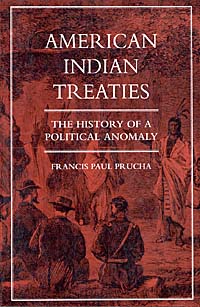 | Title: American Indian treaties: the history of a political anomaly Author: Prucha, Francis Paul Published: University of California Press, 1997 Subjects: History | Native American Studies | Law Publisher's Description: American Indian affairs are much in the public mind today - hotly contested debates over such issues as Indian fishing rights, land claims, and reservation gambling hold our attention. While the unique legal status of American Indians rests on the historical treaty relationship between Indian tribes and the federal government, until now there has been no comprehensive history of these treaties and their role in American life.Francis Paul Prucha, a leading authority on the history of American Indian affairs, argues that the treaties were a political anomaly from the very beginning. The term "treaty" implies a contract between sovereign independent nations, yet Indians were always in a position of inequality and dependence as negotiators, a fact that complicates their current attempts to regain their rights and tribal sovereignty.Prucha's impeccably researched book, based on a close analysis of every treaty, makes possible a thorough understanding of a legal dilemma whose legacy is so palpably felt today. [brief] Similar Items |